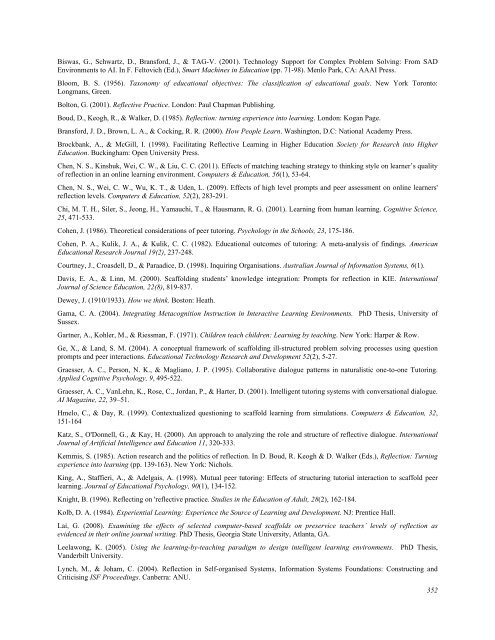January 2012 Volume 15 Number 1 - Educational Technology ...
January 2012 Volume 15 Number 1 - Educational Technology ...
January 2012 Volume 15 Number 1 - Educational Technology ...
Create successful ePaper yourself
Turn your PDF publications into a flip-book with our unique Google optimized e-Paper software.
Biswas, G., Schwartz, D., Bransford, J., & TAG-V. (2001). <strong>Technology</strong> Support for Complex Problem Solving: From SAD<br />
Environments to AI. In F. Feltovich (Ed.), Smart Machines in Education (pp. 71-98). Menlo Park, CA: AAAI Press.<br />
Bloom, B. S. (1956). Taxonomy of educational objectives: The classification of educational goals. New York Toronto:<br />
Longmans, Green.<br />
Bolton, G. (2001). Reflective Practice. London: Paul Chapman Publishing.<br />
Boud, D., Keogh, R., & Walker, D. (1985). Reflection: turning experience into learning. London: Kogan Page.<br />
Bransford, J. D., Brown, L. A., & Cocking, R. R. (2000). How People Learn. Washington, D.C: National Academy Press.<br />
Brockbank, A., & McGill, I. (1998). Facilitating Reflective Learning in Higher Education Society for Research into Higher<br />
Education. Buckingham: Open University Press.<br />
Chen, N. S., Kinshuk, Wei, C. W., & Liu, C. C. (2011). Effects of matching teaching strategy to thinking style on learner’s quality<br />
of reflection in an online learning environment. Computers & Education, 56(1), 53-64.<br />
Chen, N. S., Wei, C. W., Wu, K. T., & Uden, L. (2009). Effects of high level prompts and peer assessment on online learners'<br />
reflection levels. Computers & Education, 52(2), 283-291.<br />
Chi, M. T. H., Siler, S., Jeong, H., Yamauchi, T., & Hausmann, R. G. (2001). Learning from human learning. Cognitive Science,<br />
25, 471-533.<br />
Cohen, J. (1986). Theoretical considerations of peer tutoring. Psychology in the Schools, 23, 175-186.<br />
Cohen, P. A., Kulik, J. A., & Kulik, C. C. (1982). <strong>Educational</strong> outcomes of tutoring: A meta-analysis of findings. American<br />
<strong>Educational</strong> Research Journal 19(2), 237-248.<br />
Courtney, J., Croasdell, D., & Paraadice, D. (1998). Inquiring Organisations. Australian Journal of Information Systems, 6(1).<br />
Davis, E. A., & Linn, M. (2000). Scaffolding students’ knowledge integration: Prompts for reflection in KIE. International<br />
Journal of Science Education, 22(8), 819-837.<br />
Dewey, J. (1910/1933). How we think. Boston: Heath.<br />
Gama, C. A. (2004). Integrating Metacognition Instruction in Interactive Learning Environments. PhD Thesis, University of<br />
Sussex.<br />
Gartner, A., Kohler, M., & Riessman, F. (1971). Children teach children: Learning by teaching. New York: Harper & Row.<br />
Ge, X., & Land, S. M. (2004). A conceptual framework of scaffolding ill-structured problem solving processes using question<br />
prompts and peer interactions. <strong>Educational</strong> <strong>Technology</strong> Research and Development 52(2), 5-27.<br />
Graesser, A. C., Person, N. K., & Magliano, J. P. (1995). Collaborative dialogue patterns in naturalistic one-to-one Tutoring.<br />
Applied Cognitive Psychology, 9, 495-522.<br />
Graesser, A. C., VanLehn, K., Rose, C., Jordan, P., & Harter, D. (2001). Intelligent tutoring systems with conversational dialogue.<br />
AI Magazine, 22, 39–51.<br />
Hmelo, C., & Day, R. (1999). Contextualized questioning to scaffold learning from simulations. Computers & Education, 32,<br />
<strong>15</strong>1-164<br />
Katz, S., O'Donnell, G., & Kay, H. (2000). An approach to analyzing the role and structure of reflective dialogue. International<br />
Journal of Artificial Intelligence and Education 11, 320-333.<br />
Kemmis, S. (1985). Action research and the politics of reflection. In D. Boud, R. Keogh & D. Walker (Eds.), Reflection: Turning<br />
experience into learning (pp. 139-163). New York: Nichols.<br />
King, A., Staffieri, A., & Adelgais, A. (1998). Mutual peer tutoring: Effects of structuring tutorial interaction to scaffold peer<br />
learning. Journal of <strong>Educational</strong> Psychology, 90(1), 134-<strong>15</strong>2.<br />
Knight, B. (1996). Reflecting on 'reflective practice. Studies in the Education of Adult, 28(2), 162-184.<br />
Kolb, D. A. (1984). Experiential Learning: Experience the Source of Learning and Development. NJ: Prentice Hall.<br />
Lai, G. (2008). Examining the effects of selected computer-based scaffolds on preservice teachers’ levels of reflection as<br />
evidenced in their online journal writing. PhD Thesis, Georgia State University, Atlanta, GA.<br />
Leelawong, K. (2005). Using the learning-by-teaching paradigm to design intelligent learning environments. PhD Thesis,<br />
Vanderbilt University.<br />
Lynch, M., & Joham, C. (2004). Reflection in Self-organised Systems, Information Systems Foundations: Constructing and<br />
Criticising ISF Proceedings. Canberra: ANU.<br />
352

















